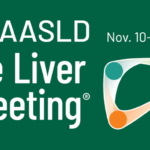
Editor’s Note: Portal hypertension is the main pathophysiological cause of decompensation events in patients with cirrhosis and is a major driver of liver function deterioration. Non-selective β-blockers (NSBBs) are widely used clinically as the first-choice medication to reduce portal hypertension and prevent bleeding from esophagogastric varices.
At the recently concluded international flagship event of hepatology – the Annual Meeting of the American Association for the Study of Liver Diseases (AASLD 2023), a team led by Professor Jidong Jia and Professor Hong You from the Beijing Friendship Hospital affiliated with Capital Medical University presented a study. This research analyzed the efficacy and safety of the third-generation NSBB, carvedilol, in preventing esophageal variceal (EVs) in patients with hepatitis B-related cirrhosis.
The journal “Hepatology Digest” had the honor of inviting the study’s first author and oral presenter at the conference, Assistant Researcher Bingqiong Wang, to introduce the team’s findings and share their experiences from the conference. The research and interview content shared below.

Study Overview
Carvedilol Combined with Nucleos(t)ide Analogs (NUCs) to Prevent the Progression of Esophageal Varices in Virologically Suppressed Hepatitis B Cirrhosis Patients: A Randomized, Open-Label Clinical Trial
206: CARVEDILOL PLUS NUCS TO PREVENT THE PROGRESSION OF ESOPHAGEAL VARICES IN VIROLOGICAL SUPPRESSED HBV-CIRRHOSIS PATIENTS: A RANDOMISED, OPEN-LABEL TRIAL.
First author: Bingqiong Wang; Corresponding authors: Jidong Jia, Hong You
Background: Portal hypertension can be classified into cirrhotic and non-cirrhotic portal hypertension, depending on the cause. Clinically, portal hypertension caused by various etiologies of cirrhosis accounts for about 90%, and controlling the cause of cirrhosis can effectively alleviate portal hypertension in patients. However, the efficacy of β-blockers, especially their impact on mild esophageal varices (EVs), is not yet clear. Therefore, to clarify the effect of carvedilol in preventing the progression of esophageal varices in the population with hepatitis B-related cirrhosis undergoing antiviral treatment, this multicenter prospective randomized controlled study was initiated.
Methods: This randomized controlled trial included patients with hepatitis B cirrhosis combined with mild to moderate esophageal varices. Patients were randomly divided into two groups: one receiving NUCs (nucleos(t)ide analogs) treatment and the other receiving carvedilol 12.5 mg + NUCs treatment (distributed in a 1:1 ratio). The primary endpoint of the study was the incidence rate of progression of esophageal varices after a 2-year follow-up (NCT 03736265).
Results: The study enrolled 238 patients meeting the inclusion criteria (77.3% with mild EVs), randomly divided into NUCs group (n=119) and carvedilol + NUCs group (n=119). Of these, 205 patients (86.1%) completed endoscopic examinations. In the NUCs group, the progression rate of EVs was 15.5% (16/103), while in the carvedilol combined treatment group it was 12.7% (13/102) (RR=0.80, 95%CI: 0.36~1.77, P=0.59). Subgroup analysis for patients with moderate EVs showed that the carvedilol combined treatment group was more effective in improving EVs than NUCs alone (43.5% vs. 13.1%, P=0.03), but no significant difference was observed in mild cases (P=0.50). Additionally, there was no significant difference in the incidence of liver-related events (decompensation, hepatocellular carcinoma, death/liver transplantation) within 2 years between the two groups (11.2% vs. 10.4%, P=0.88).

Conclusion: In patients with virologically suppressed hepatitis B cirrhosis, adding carvedilol to treatment did not show additional benefits in reducing portal pressure compared to continuing antiviral therapy alone. However, adding carvedilol may help improve the prognosis of patients with moderate esophageal varices.
Researcher’s Comments
Reflecting on the past, discussing the initial intent and background of the study:
The idea for this study originated in 2016, when we observed that some patients with hepatitis B cirrhosis, despite receiving antiviral treatment, still experienced disease progression, particularly complications related to portal hypertension. Therefore, whether these patients required additional medication to reduce portal hypertension and the corresponding clinical efficacy was unclear. For this reason, we designed a randomized controlled clinical trial to answer these clinical questions.
In this study, we included 241 randomized patients and further analyzed the progression of esophageal varices in patients who completed a second gastroscopy. Overall, for patients who were added carvedilol, no additional benefits were observed compared to continuing antiviral treatment alone. We then conducted an in-depth subgroup analysis based on the severity of the patients’ esophageal varices. The data showed that while no additional efficacy of carvedilol was observed in patients with mild esophageal varices, in patients with moderate varices, carvedilol could delay the progression of esophageal varices, particularly in reversing the varices, with a statistically significant difference. This encouraging result provides important evidence support for optimizing the clinical treatment plan for patients with cirrhosis combined with portal hypertension, especially those with esophageal varices.
Summarizing the experiences and feelings from the AASLD conference:
We were honored and delighted that our study was selected for oral presentation at the AASLD conference. From my perspective, this study focuses on a globally significant issue, namely, how to select and use medication to reduce portal hypertension in patients with cirrhosis, which is a current clinical focus. To ensure high-quality research evidence, we adopted a scientifically rigorous randomized controlled trial design. Throughout the study, we collaborated with 13 medical centers nationwide to ensure the accuracy and reliability of our results, gaining recognition from scholars at home and abroad, and providing the opportunity for exchange and discussion.
Overall, I had two prominent feelings from attending this conference. First, the comprehensive and in-depth content setup of the conference, especially the latest research developments in non-invasive diagnosis and treatment of fatty liver, hepatitis B, and portal hypertension, as well as new drug development, were overwhelming. Reports on the application of artificial intelligence in clinical practice also provided me with new research ideas and perspectives. Secondly, after many years, having the opportunity to attend such an international event and seeing the academic enthusiasm of scholars from different countries was inspiring and conducive to my academic growth.
Lastly, I sincerely thank my mentors, Professor Jidong Jia and Professor Hong You, for their patient guidance and all the scholars who participated in this study for their strong support.
References:
[1] Wang BQ, Zhou J, Wu X, et al. Carvedilol plus NUCs to prevent the progression of esophageal varices in virological suppressed HBV-cirrhosis patients: a randomised, open-label trial. AASLD 2023, Oral 206.


TAG: AASLD, Voice of China, Cirrhosis, HBV


